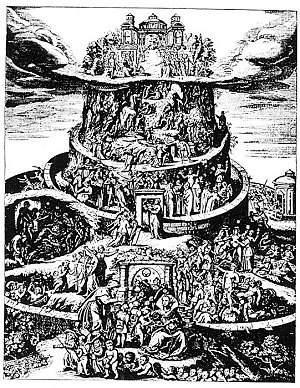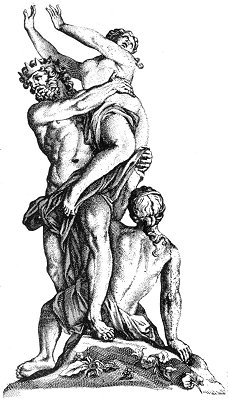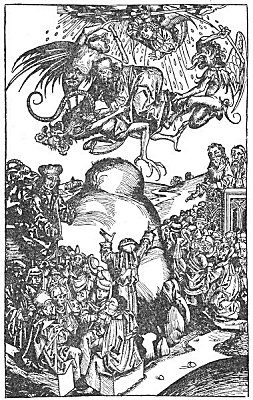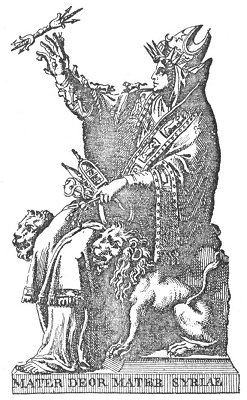“Spartacus (Weishaupt) had collected many materials for this, and I added my discoveries in the instructions for these two degrees. Our people, therefore, being convinced that we alone are possessed of the real secrets of Christianity, we have but to add a few words against the Clergy and Princes. In the last mysteries we have to unfold to our adepts this pious fraud, and then by writings demonstrate
p. 489
the origin of all religious impositions, and their mutual connexion with each other.” 4
If the reader be not too much disgusted with this pious fraud, but can still attend to the declamations of the Hierophant, let us once more enter that den of demons wherein presides the triple genius of impiety, hypocrisy, and anarchy.
The Hierophant is about to say, “that their grand and ever-celebrated master, Jesus of Nazareth, appeared in an age when corruption was universal; in the midst of a people who from time immemorial had been subjected to, and severely felt the yoke of slavery; 5 and who eagerly expected their deliverer announced by the Prophets. Jesus appeared and taught the doctrine of reason; to give greater efficacy to these doctrines, he formed them into a religion, and adopted the received traditions of the Jews. He prudently grafted his new school on their religion and their customs, which he made the vehicle of the essence and secrets of his new doctrines. He did not select sages for his new disciples, but ignorant men chosen from the lowest class of the people, to show that his doctrine was made for all, and suitable to every one’s understanding; to show too, that the knowledge of the grand truths of reason was not a privilege peculiar to the great. He does not teach the Jews alone, but all mankind, the means of acquiring their liberty, by the observation of his precepts. He supported his doctrines by an innocent life, and sealed them with his blood.”
“His precepts for the salvation of the world are, simply, the love of God and the love of our neighbour; he asks no more. . . .Nobody ever reduced and consolidated the bonds of human society within their real limits as he did—No one was ever more intelligible to his hearers, or more prudently covered the sublime signification of his doctrine. No one, indeed, ever laid a surer foundation for liberty than our grand master, Jesus of Nazareth. It is true, that on all occasions (in ganzen) he carefully concealed the sublime meaning and natural consequences of his doctrines; for he had a secret doctrine, as is evident from more than one passage of the Gospel.”
It was during the time that he was writing this hypocritical history of the Messiah, that Weishaupt was turning the credulous proselyte into ridicule; as to the other adepts, he well knew that they anticipated such explanations, or at least would be delighted with them. Hence that impudence with which he falsifies the Scriptures. To prove the existence of this secret school, the doctrines of which are reserved for the initiated alone, he cites these words of Christ: “To you is given to know the mystery of the kingdom of God; but to them that are without, all things are done in parables.” 6 But he carefully avoids mentioning the order which Christ gives to his disciples, “That which I tell you in the dark, speak ye in the light; and that which you hear in the ear, preach ye upon the house-tops.” 7 Weishaupt then proceeds to these words: “And their princes have power over them but it is not so among you; but whoever will be greater shall be your minister.” 8 This precept, as well as all those on Christian humility, he transforms into principles
p. 490
of disorganizing equality inimical to all constituted authorities.—With equal ease he avoids all those lessons so often repeated both by Christ and his Apostles, on the obligation of rendering to Cæsar what is Cæsar’s, of paying tribute, and of recognizing the authority of God himself in that of the law and of the magistrates. If Christ has preached the love of our neighbour, or fraternal love, his words are immediately perverted by Weishaupt into a love of his Equality. If Christ exhorts his disciples to contemn riches, the impostor pretends it is to prepare the world for that community of riches which destroys all property. In fine, the conclusions drawn from these impious and deriding explanations, and from many others of a similar nature, are contained in the following words:

Moe is the founder of GnosticWarrior.com. He is a father, husband, author, martial arts black belt, and an expert in Gnosticism, the occult, and esotericism.





